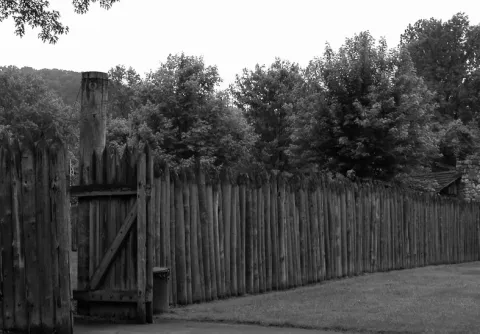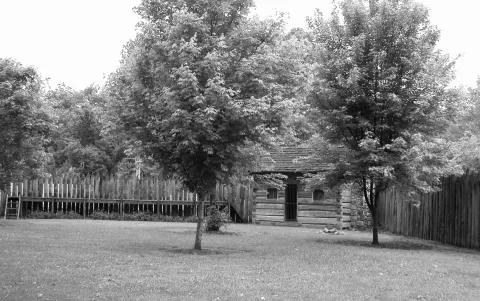The Indian Battle of Sharp’s Station

December 1794
Nicholas Gibbs stood on the banquette (baNGˈket) of the fort overlooking the wooded forest and mountain ridges. He had risen early from a light sleep before dawn to stay on watch for any uninvited guests. He had been there all day trying to get a glimpse of the Indian war party known to be in the area.
It had been three weeks since the news of the brutal murder of his friend Peter Graves. Peter had met his end on the mountain overlooking Henry Sharp’s Station where he was ambushed and scalped by a war party of Cherokees. It was early December, the weather was mild for winter, and it was easy to see anything moving in the trees as there were no leaves this time of year.
The fort and the people living around the fort were concerned for their defense since they were dangerously low on powder for their muskets. Many of the men of the fort had crossed the Clinch and Powell River to Meredith’s Cave near current day Shanghai on property belonging to the Sharps to collect bat dung for niter to use to manufacture gunpowder. Nicholas, Henry Sharp and Levi Hinds were the only men left at the fort and about a score of young children, perhaps as many women and girls and several boys from the cabins nearby. Nicholas and his family were also low on powder, and he had decided to come to the fort to help organize the defense, utilizing the men, women, and children who were left behind.
Standing guard and allowing his mind to wander, Nicholas began to ponder the last few days. He thought back to the day he had left his family to make his journey here.
His compound was in the valley just North of Knob Ridge—a good twenty miles to the south. To protect his family and property, he needed several pounds of gunpowder. His stockade was running crucially low of shot and powder and he knew where to get it. The only thing was…It was two days of rough riding through treacherous territory.
Moreover, he knew that his friends were in peril due to Indian attacks, and he wanted to check on his friends. Subsequently, the powder and shot he could secure and the help he could lend to his old friends would make the trip more than worthwhile.
He had ridden the trail to the Clinch River Station many times and this journey was no different. Going over the route in his mind, he thought about the people and places he had seen along the way. He remembered as he mounted his horse and bid his wife Mary and his rather large family goodbye and how painful it was leaving them behind.
The beginning of the trail had been easy in the beginning. He remembered passing George Mann’s Farm and in no time, he was at the Graves Settlement. From there he turned north up and down the ridges, going down the long steep ridge to finally reach the smelly leather works on the Bull Run Creek. The trail was steep, and he took his time and grasped the horse’s mane, being careful not to let his saddle slip over the horse’s head.
Reaching the creek, he coaxed his horses into the water and proceeded up the creek, through the gap of the ridge to John Miller’s complex.
While there he was encouraged to stay the night, rest, and feed and water his horses. Continuing his journey on the following morning, he proceeded northwest to the river. Upon reaching the Clinch he turned west and followed the river until he reached the station.
Suddenly there was a sound of leaves rustling in the woods and it jolted him back to the present. An inner feeling told him to be on high alert.
It was nearly nightfall, and the long day was taking a heavy toll on Nicholas. With the dusk falling it brought nocturnal sounds of birds, animals and a myriad of night sounds. Just then he heard an owl. No, it wasn’t an owl. It was different somehow. Something in the notes of the owls aroused his curiosity.
He and his comrades discussed the situation, and they were convinced that a considerable force of Indians was about. Nicholas and the other men placed the small children in one of the cabins of the station while the women and older children were divided into four companies to help withstand an attack. Muskets were loaded and everyone who could shoot was placed strategically around the fort. Suddenly the owl calls ceased. There was perceptible movement outside in the woods.
Earlier that day the men had held refresher training for their army of women and children. Boston Graves was one those trainees. He had been heartbroken over the death of his father, and he was determined to avenge his death. Muskets were gathered and everyone including Boston were given instructions how to load their muskets and be at the ready.
Boston thought to himself, “I’ll give those savages something to remember us by” so he enthusiastically loaded his musket with a triple charge of power. At a very young age, Peter had meticulously taught his son all there was to know musket handling. Boston had been hunting with his father since he was a small child; therefore, the long gun was extremely familiar to him.
Unexpectantly, the heavy chain at the stockade gate rattled and a low moaned almost guttural Indian voice said, “OPEN” This aroused the bear dogs which rushed about the stockade barking furiously. The reply to the Indian at the gate came as a rifle shot. The Indian war whoops, howls and shrieks were heard all around. Volleys were exchanged as the fire fight ensued. Bullets whizzed by like mad hornets and a bullet lightly grazed Boston just above his ear. Furious, he raised his musket toward the woods.
There was an Indian lurking just in front of his position. Up went the rifle. Boston pulled the trigger—nothing happened. He pulled the trigger again—nothing. Whoops! He had forgotten to prime the priming pan. Gently he removed the powder horn from his shoulder and poured a generous amount into the priming pan.
Once more he pulled the trigger. BOOM! The blast was so loud that everyone in the compound turned to see where it originated. The blast of the rifle was so strong it had knocked poor Boston off his feet, transported him clear across the fort where he landed helter-skelter against the opposite wall. Stunned, Boston laid there a few moments and finally came his senses. Boston’s battle was over and surprisingly he would live to fight another day.
The battle lasted through the night, but the fighters reported no casualties except a few cuts and bruises. Before daybreak the Indians had lifted the siege and blood was found on all sides of the station.
The skirmish never reached the Knoxville Gazette, but it was a story that was long told around the Clinch River community.
This unreported Indian battle was perhaps the most hotly contested fight in the annals of East Tennessee history. The bullet holes on the old log station remained as testament to the brave courage of the men, women and children who fought the Battle of Sharp's Station.
- Log in to post comments
